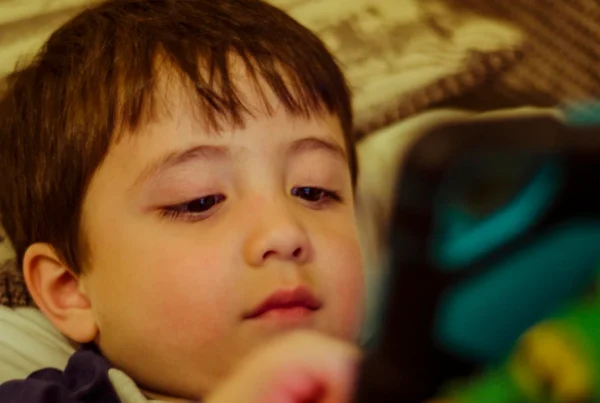Parenting in the digital age has brought multiple challenges and complexities that previous generations never grappled with. As the influence of technology continues to grow, parents find themselves navigating an ever-evolving landscape.
The digital world offers a plethora of screens, devices, and online distractions that constantly compete for our children’s attention.
Smartphones and the internet have become an integral part of our kids’ lives, shaping their experiences in ways that we, as parents, may not fully comprehend.
In this article, we will explore five essential tips for mindful parenting in the digital age to help you find a balance that benefits your children’s growth and development.
We will also delve into how incorporating biblical principles can guide us in this journey, offering a strong moral and spiritual foundation for our kids in an increasingly digital world.
What Does Mindful Parenting Means?
Before exploring practical steps, it helps to understand the definition.
Mindful parenting is the practice of giving your full attention to your children, staying present in each moment, and noticing your own emotions before responding.
It calls parents to listen carefully, remain aware, and choose words and actions with care.
Research in family psychology review and studies in clinical child development show that using simple mindfulness techniques can bring lasting benefit.
These findings reveal that when parents approach parenting with curiosity and patience, both kids and adults learn to manage their stress and build stronger bonds.
Why Mindfulness in Parenting Scale Matters
Embracing mindful parenting is not about being a perfect parent. Instead, it invites you to slow down and practice compassion during difficult situations.
By pausing to listen and reflect, parents can guide their children through everyday challenges without letting a stressful situation or rising frustration control the home. This steady approach helps the whole family thrive.
Mindful practice also supports emotional health. Becoming more aware of your own emotional state allows you to respond to your kids with understanding and positive guidance.
Over time, this reduces stress, nurtures secure attachment, and improves behavior patterns for both children and parents.
Read more: Understanding Parenting Education for Christian Parents

5 Key Factors of Mindful Parenting to Improve Parent-Child Relationships
Mindful parenting involves being fully present and engaged in interactions with children.
It fosters a compassionate and aware approach that strengthens parent-child relationships and supports human development. Here are five key factors that help create a nurturing and supportive environment for your child.
1. Present-Moment Awareness
Being present means actively engaging in the moment with your child instead of worrying about what is happening elsewhere. This focused attention helps parents notice their child’s needs and respond with care.
Practicing present-moment awareness reduces parenting stress and supports mental health because it allows parents to respond thoughtfully rather than react impulsively.
Simple mindfulness techniques such as mindful breathing, quiet walks, or pausing before you speak can bring a sense of calm and balance to daily life.
2. Emotional Regulation to Prevent Parenting Stress
Emotional regulation is crucial because it helps parents manage their own feelings before they escalate.
When you stay calm, you model healthy coping strategies and prevent stressful situations from turning into conflict.
Parents who manage their emotions create a stable home environment that benefits children and protects against anxiety or depression.
Gentle exercise, relaxation routines, and positive self-talk all support this balance and offer lasting mental health benefits for both parent and child.
3. Compassionate Listening to Enhance Emotional Well-being
Compassionate listening means giving children full attention and empathy when they speak, an essential part of human development. Children who feel heard build stronger self-esteem and emotional security.
To practice compassionate listening, focus on your child’s words, reflect on their feelings, and avoid giving unsolicited advice or judgments. Mindful parenting that includes compassionate listening also strengthens a child’s communication skills and emotional intelligence.
4. Non-Judgmental Attitude
Maintaining a non-judgmental attitude helps children express themselves without fear of criticism. Accepting their emotions and behaviors without quick labels creates a safe space where everyone can share openly.
Parents who approach situations without harsh judgment lower family stress and support mental health for all. This perspective encourages children to learn from mistakes and build resilience, laying a foundation for future success.
5. Intentionality in Parenting
Intentional parenting means making thoughtful choices and setting clear goals for your child’s growth. Planning meaningful activities and showing interest in your child’s passions create opportunities for them to thrive.
Mindful parents who stay organized even on busy days help their children feel secure and supported. Intentional family routines bring lasting benefits, from stronger relationships to improved emotional and social development.
Tips to Practice Mindful Parenting

Today’s world is filled with screens and gadgets. At this age, mindful parenting has its own set of challenges.
As we keep up with the digital age, finding the right balance for our kids becomes more important.
So, let’s dive into five practical tips that can help us, as parents, to practice mindful parenting and find that sweet spot where our kids can benefit from technology without losing touch with the real world.
1. Leading by Example: Be a Role Model
The Bible teaches us the importance of setting an example for our children. Proverbs 22:6 says, “Train up a child in the way he should go; even when he is old, he will not depart from it.”
This verse reminds us that to effectively guide our children through the digital age, we must first exemplify the behaviors we wish to instill in them. Children, particularly preschool children, develop their social behavior by observing us.
If we want our kids to develop a healthy relationship with technology, it starts with our own relationship with it. Here’s how:
- Set boundaries on your screen time and demonstrate a balanced approach to digital devices.
- Share your own experiences and challenges with technology, emphasizing the importance of responsible and mindful use.
- Be present when you are with your kids, showing them that quality time together is invaluable.
- Teach them to prioritize relationships over screens, just as the Bible emphasizes the importance of love and human connection.
By being mindful of our own emotions and practicing self-compassion, we can demonstrate a parenting style that supports our child’s attachment and emotional security.
2. Set Clear Boundaries and Guidelines
Proverbs 29:15 advises, “The rod and reproof give wisdom, but a child left to himself brings shame to his mother.”
This verse reminds us of the need for discipline and guidance in a child’s life. In the digital age, boundaries and guidelines are crucial to ensure that technology does not dominate our children’s lives.
Establish clear rules regarding online activities and content consumption. Make these guidelines a part of your family’s routine.
It is essential that your children understand the importance of balance and responsibility when using technology. Just as God’s commandments guide us in living a righteous life, these rules can serve as a moral compass in the digital world.
3. Engage in Open Communication
Communication is key in any aspect of parenting, especially when it comes to technology.
Ephesians 4:29 reminds us, “Let no corrupting talk come out of your mouths, but only such as is good for building up, as fits the occasion, that it may give grace to those who hear.”
This verse reminds us to encourage open and non-judgmental discussions with our children about their digital experiences.
Ask your children what they do online. Be curious, not critical. Mindfulness interventions show that when parents respond calmly and non-judgmentally, children feel safer opening up, especially about sensitive online experiences like cyberbullying or inappropriate content.
Here are some tips to encourage open conversation:
- Use dinner or bedtime as a moment for “tech talks.”
- Avoid interrupting or rushing—practice active listening.
- Pray together about what your child sees and experiences online.
These moments help develop a child’s discernment and trust in their parent’s spiritual and emotional guidance.
4. Emphasize Quality Over Quantity
In the digital age, the quest for more screen time can become an all-consuming obsession for many children.
Just as Ecclesiastes 3:1 reminds us, “For everything, there is a season, and a time for every matter under heaven.” Teach your children the importance of balance and moderation in their screen time.
Encourage them to pursue other interests, hobbies, and activities that enrich their lives. Emphasize the value of quality over quantity when it comes to online content.
Help them discern between educational and recreational content, guiding them towards meaningful and enriching experiences online.
By instilling these principles, you can ensure that your children use technology as a tool for growth and not as a mindless distraction.
5. Pray Together and Foster Faith
In a world where technology often competes with faith, it is essential to nurture your child’s spiritual well-being constantly.
Building a habit of praying together as a family and seeking guidance from the Bible can provide a strong foundation for your children to rely on.
Encourage your children to seek God’s wisdom when faced with challenges in the digital age.
Remind them that faith is an anchor that can help them navigate the ever-changing tides of the digital world. Share biblical stories and lessons that resonate with their experiences online, reinforcing the importance of living a life guided by faith and values.
Read more: The Importance of Parent Involvement in Education: Support, not Hover
Calm in the Chaos: Mental Health Strategies for Parental Stress
Parenting is rewarding but can feel overwhelming when demands pile up and time feels scarce. By learning intentional ways to care for your own well-being, you create a calmer home and a stronger connection with your children.
1. Recognize Your Stress Signals
Every parent experiences stress differently. You might notice tight shoulders, racing thoughts, or irritability, all of which can be signs of rising tension.
Paying attention to these early cues allows you to pause before emotions boil over. This self-awareness helps you respond thoughtfully to your child instead of reacting on impulse.
2. Create Micro-Moments of Calm
You don’t need a full hour to recharge; a few deep breaths or a brief walk can reset your mind.
Small breaks sprinkled throughout the day keep tension from building up. Over time, these mini-practices lower stress and show your kids healthy coping skills.
3. Build a Support Network
Whether it’s a friend, family member, or local parent group, having someone to lean on is vital.
Sharing struggles and victories reduces feelings of isolation and offers fresh perspective. A strong support system also provides practical help when you need a breather.
4. Set Boundaries and Prioritize
It’s easy to say yes to every request, but overcommitting fuels burnout. Decide which tasks truly matter and let go of less important ones.
Clear boundaries free up energy for what counts most, such as nurturing yourself and enjoying time with your children.
Conclusion
Parenting in the digital age is undoubtedly a challenge, but it is also an opportunity to instill vital life lessons grounded in faith and values.
Through leading by example, setting clear boundaries, engaging in open communication, emphasizing quality over quantity, and fostering faith, you can guide your children to find balance in their digital lives.
The Bible’s timeless wisdom provides an unshakable foundation for navigating this complex landscape, ensuring that your children grow into responsible, discerning, and spiritually grounded individuals.
As you embark on this journey, remember the words of Proverbs 22:6, “Train up a child in the way he should go, and when he is old, he will not depart from it.” Your efforts in mindful parenting will shape their lives and guide them on the path of righteousness in a digital age.
Another way that you can use to navigate your children is to choose the best education for their youth. Therefore, you have to find out which school can provide the right guidance with a Christian basis that focuses on Christ.
If you’re looking for a school that shares these values and principles, we invite you to explore more about Sekolah Pelita Harapan (SPH), a Christian international school dedicated to providing an education that nurtures both the mind and spirit.
SPH has been committed to providing the best education through every program and curriculum to nurture your child’s character growth based on the Christian worldview.
To learn more about SPH and the opportunities it offers for your child’s education and spiritual development, visit our website today.









